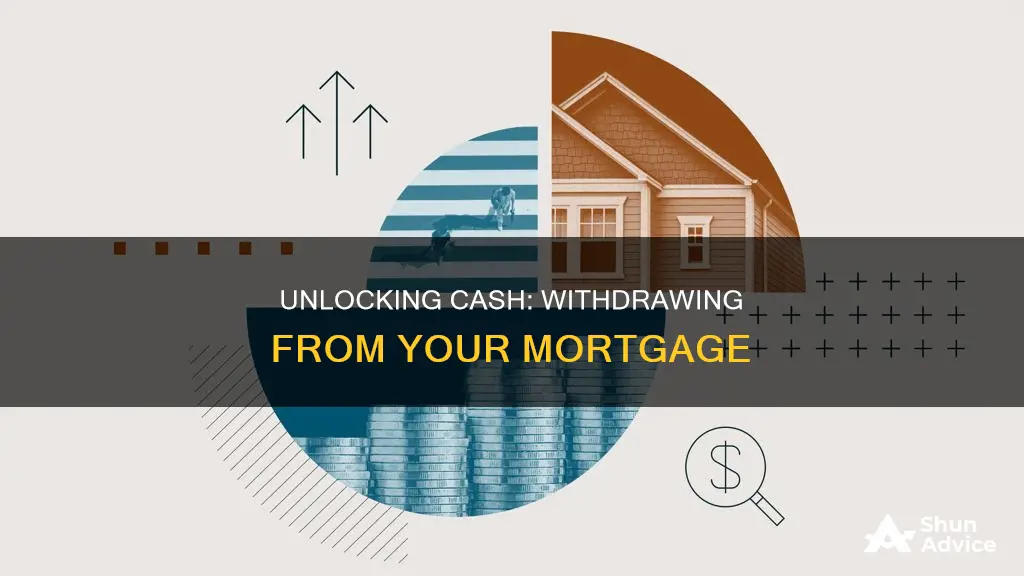
There are several ways to take money out of your mortgage, including cash-out refinancing, home equity loans, and home equity lines of credit (HELOCs). Cash-out refinancing involves taking out a new mortgage for more than you owe on your existing loan but less than your home's current value. Home equity loans and HELOCs are second mortgages that allow you to borrow against your home's equity. These options can provide access to needed funds without having to sell your home, but it's important to consider the potential risks, such as higher interest rates and the risk of foreclosure.
How do I take money out of my mortgage?
| Characteristics | Values |
|---|---|
| Cash-out refinance | Taking out a new mortgage for more than you owe on your existing home loan but less than your home's current value. |
| Home equity loan | A fixed-rate loan that provides a lump sum of cash. Requires 15% to 20% equity, a 620+ credit score, a max DTI of 45%, and sufficient income. |
| HELOC (Home Equity Line of Credit) | A line of credit that allows you to borrow against your home's equity as needed. Typically has a draw period of 5-10 years, followed by a repayment period of up to 20 years. |
| Personal loans | Unsecured loans that provide quick access to cash but generally have higher interest rates and shorter repayment periods. |
| FHA Streamline Refinance | An FHA mortgage program with less paperwork, designed to lower mortgage payments for borrowers with lower credit scores. Limited to $500 cash out. |
| Sale-leaseback program | Allows homeowners with bad credit to access their home equity by selling their property and then leasing it back, continuing to live in the home as tenants. |
| Reverse mortgages | One of several options to access equity without refinancing, along with home equity loans, HELOCs, and home equity investments. |

Cash-out refinance
A cash-out refinance is a way to access the equity in your home by withdrawing a portion of its value. This is done by taking out a new mortgage that is larger than the one currently on your home. The new loan is used to pay off the old one, and the remainder is paid to you in cash. This can be a good option if you have built up equity in your home by paying down your mortgage or if your home value has increased.
The funds from a cash-out refinance can be used for anything, including debt consolidation, home repairs or upgrades, college tuition, starting a business, or paying for a wedding. However, it's important to note that a cash-out refinance increases your loan balance and monthly payments, so you need to balance your cash needs with your ability to repay a larger mortgage loan. Additionally, because your home is the collateral for any kind of mortgage, you risk losing it if you can't make the payments.
When considering a cash-out refinance, it's important to shop around for rates from multiple lenders to get the best deal. You should also be aware that there will be closing costs and fees associated with the refinance, which can total 2%-6% of the loan amount.
Compared to other options for accessing your home equity, such as a home equity loan or a home equity line of credit (HELOC), a cash-out refinance may offer a lower interest rate. However, it's important to carefully consider the pros and cons before committing to any type of loan.
Requesting a Payoff: A Guide to Phh Mortgage
You may want to see also

Home equity loan
A home equity loan is a fixed-rate loan that allows you to borrow money using the equity in your home as collateral. The amount of equity is calculated by subtracting any existing mortgage on your property from the current market value of your home. This type of loan provides a lump sum of cash, which you can use at your discretion, although it is recommended to reserve it for substantial expenses that will help build wealth, such as renovations that increase your home's value.
To qualify for a home equity loan, you will generally need to have built up a significant amount of equity, with a minimum of 15% to 20% paid off. Lenders will also consider your credit score, with a minimum requirement of 620, and your debt-to-income ratio, which should not exceed 45%. It is important to note that home equity loans have serious financial consequences if you fail to make the monthly payments, including the risk of foreclosure.
Compared to other forms of credit, home equity loans tend to have lower interest rates due to being secured by your home equity. They also offer the advantage of fixed interest rates, resulting in predictable monthly payments without the worry of unexpected rate hikes. Additionally, home equity loans have minimal closing costs, although they may have upfront fees and costs that should be considered when shopping around.
Removing a Spouse from a Mortgage: A Step-by-Step Guide
You may want to see also

HELOC
A home equity line of credit, or HELOC, is a second mortgage that gives you access to cash based on the value of your home. It can also be a primary mortgage if you own your home outright. HELOCs are a revolving line of credit, similar to a credit card. You can borrow what you need, repay it, then borrow again during a set draw period. Typically, the total length of a HELOC is 30 years.
To qualify for a HELOC, you need to have available equity in your home, meaning the amount you owe on your home must be less than the value of your home. You can typically borrow up to 85% of the value of your home minus the amount you owe, though this varies by lender. Lenders will also look at your credit score and history, employment history, monthly income, and monthly debts.
There are a few options to withdraw money from a HELOC account. You can access it via online transfer, with a bank card at an ATM or point of sale, or by writing cheques from the account if the lender issues them. In addition to interest, there are further costs to consider before taking out a HELOC, including closing costs and annual fees.
Exploring Options: Strategies to Temporarily Pause Mortgage Payments
You may want to see also

Risks of foreclosure
There are several ways to take money out of your mortgage, including:
- Cash-out refinance: Taking out a new mortgage for more than you owe on your current loan, but less than your home's current value.
- Home equity loan: A fixed-rate loan that provides a lump sum of cash.
- HELOC (Home Equity Line of Credit): A line of credit that allows you to withdraw and repay money over a draw period, typically 10 years.
- Mortgage equity withdrawal: Withdrawing a portion of your home's value or equity.
While these options can provide access to cash, it's important to consider the risks associated with them, especially the risk of foreclosure. Here are some detailed paragraphs on the risks of foreclosure:
Risk of Losing Your Home
The primary risk of foreclosure is losing your home. When you take out a mortgage, your home serves as collateral, which means the lender can take possession of it if you fail to make the required payments. This legal process of foreclosure allows the lender to sell the property to recoup the money lent. The exact procedure and timeline for foreclosure vary depending on state laws, but it typically involves multiple phases, including payment default, notices of default and sale, and eventually eviction.
Financial Implications
Foreclosure can have significant financial implications. If your home sells for less than you owe, you may still be responsible for the remaining balance, known as a "deficiency." This can lead to further legal consequences, such as being sued or facing wage garnishment. Additionally, once you've defaulted on a mortgage, you're considered a high-risk borrower, making it more challenging to obtain another mortgage or loan in the future. Lenders will view you with caution, and you may need to wait several years before qualifying for a new mortgage, especially a conventional loan.
Impact on Credit Score
Foreclosure can severely damage your credit score, affecting your ability to obtain other loans or credit in the future. A poor credit score can also impact other areas of your financial life, such as renting an apartment or qualifying for certain jobs, especially those dealing directly with money. It may take time and effort to rebuild your credit history and improve your score after a foreclosure.
Emotional and Psychological Impact
Losing your home to foreclosure can be an emotionally distressing experience. It can cause stress, anxiety, and even depression. The process of foreclosure can be lengthy and filled with uncertainty, affecting your overall well-being and sense of stability. It's important to seek support and explore resources to help you navigate the emotional challenges that may arise during this difficult time.
Limited Housing Options
After foreclosure, you may find yourself with limited housing options. Renting a home or apartment can become more challenging, as landlords may view you as a risky tenant due to your foreclosure history. They may require higher security deposits or additional rent in advance. You may also need to provide detailed explanations and references to convince landlords to rent to you.
Understanding Mortgage Principal in Annual Reports
You may want to see also

Personal loans
If you are considering a personal loan, it is important to first check your credit score and report, as your credit history will impact your approval and interest rate. Most lenders require a minimum credit score and a certain number of years of credit history. It is recommended to shop around for the best lender terms and calculate your monthly payments before applying for a loan.
Removing Your Ex-Husband from Your Mortgage: A Step-by-Step Guide
You may want to see also
Frequently asked questions
A cash-out refinance is a way to access the equity in your home. You take out a new mortgage that's for more than you owe on your existing home loan, but less than your home's current value. You can use the money for anything you like, such as home repairs, college tuition, debt consolidation, starting a business, or paying for a wedding.
A cash-out refinance can come with higher interest rates, higher monthly payments, and a higher loan balance versus a traditional refinance. As a result, there is an increased risk of foreclosure. It also restarts your loan term, and pulling out cash can increase your mortgage payments.
Home equity loans, home equity lines of credit (HELOCs), reverse mortgages, sale-leaseback agreements, and home equity investments (HEIs) are all alternatives that allow you to tap into your equity without refinancing your existing mortgage.







